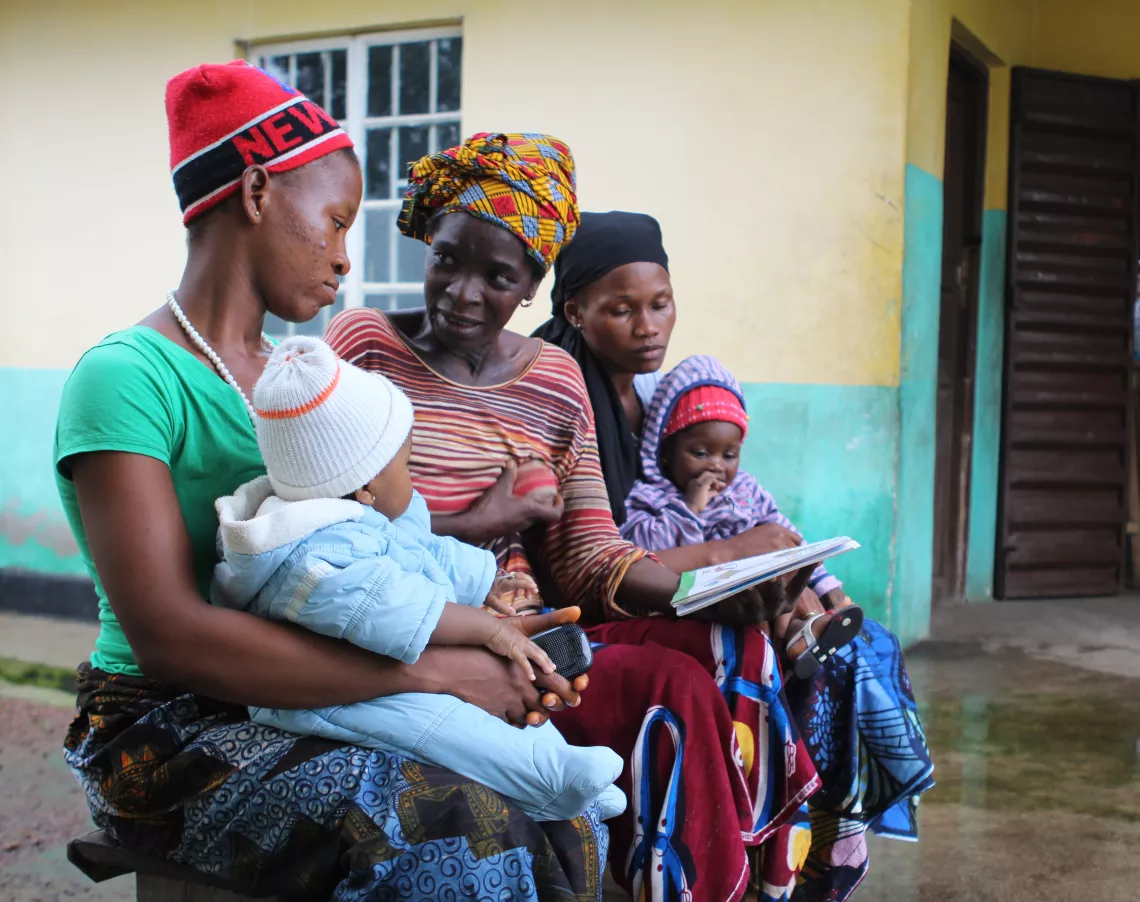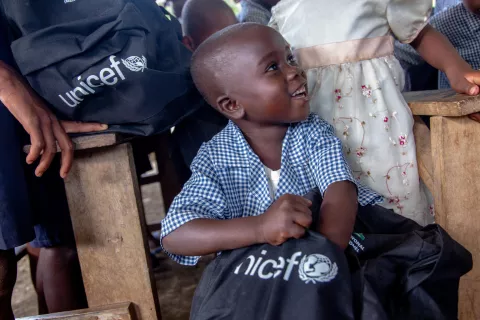Working with communities to curb malnutrition in Sierra Leone
Women are coming together in Mothers’ Support Groups to help end malnutrition by sharing experiences and advice

The recent launch of The State of Food Insecurity in Sierra Leone report shows just how dire the situation of food insecurity is in the country. More than half of the population – over 3.5 million people – do not have access to a sufficient amount of safe and nutritious food.
PORT LOKO, Sierra Leone, 3 November 2016 – It’s a rainy morning in Gbombana village, Port Loko district, but several women – and some men – have braved the downpour to get to the health centre. They have come for the weekly meeting of the Gbombana Mothers’ Support Group, a community platform for parents to share experiences and advice on infant and young child nutrition.
Fatmata Bah is the chairlady of the group. “We come together once a week to talk about how we can ensure our families, especially our children, are fed properly so that they grow up to be healthy and strong,” she said. Fatmata and her colleagues were trained to talk to parents and encourage them to exclusively breastfeed babies under six months old, and give children 6–24 months old a healthy balanced diet using local family foods along with continued breastfeeding.
According to her, the group has also been encouraging village residents, especially group members, to make backyard gardens so they can more easily provide fresh fruit and vegetables to nourish their families.

Overcoming malnutrition
In Port Loko district, the malnutrition rate remains high, with more than 9,000 malnourished children recorded in the first quarter of 2016 (for a total district population of 614,063). To promote good nutrition practices, UNICEF partner Development Initiative Programme (DIP), with support from USAID, has helped communities create 1,400 Mothers’ Support Groups in the district. “The situation was really bad before we formed these groups, as most people in the district were unaware of malnutrition, its causes and how to prevent it,” said Watta Sannoh, nutrition officer at DIP. “They have been pivotal in increasing awareness about malnutrition, which is a key step in addressing it.”
The group works closely with community based health workers to provide nutrition advice to pregnant women, mothers of breastfeeding babies, and infants. It also helps screen for malnourished children. Every Friday, in the company of one of the health workers, they visit at least one of the four villages the group covers.
“We measure every child’s arm with a Mid-Upper Arm Circumference (MUAC) measuring tape to easily find out their nutritional status, and find the malnourished ones which we send to the health facility for treatment,” said Fatmata. According to her, even though malnutrition is still a concern in villages around them, deaths have become a lot rarer as they strive to see that every case is reported, referred for treatment and monitored. Between January and July this year, the group carried out 408 screenings, and identified and referred 15 severely malnourished and 18 moderately malnourished children.
The number of children in Port Loko screened for malnutrition in the first quarter of 2016 was 28,402 (an increase of 33 per cent from the 21,299 screened in the first quarter of 2015), mainly due to the outreach efforts by the MSGs. First quarter data from the National Nutrition Surveillance Office shows a 32 per cent increase in the number of children with good nutritional status nationally, as compared to 2015 (392,917 vs 297,107).

Strengthening community bonds
According to Sullay Bah, secretary of the Gbombana Mothers’ Support Group, aside from talking to families about nutrition, they also engage in income generating activities: “Our group has a one acre mutual farm land where we grow various crops, depending on the season. We sell some of the proceeds, share some among ourselves and keep some for re-planting,” he said. A savings and loans scheme called osusu was also set up to help members improve their economic status. “We started a weekly village savings and loan programme to help us save and have access to loans to start small businesses,” he added.
Through this initiative, most members of the group have started small businesses which are helping them earn money to support their families. “I never thought I was going to be able to own a house,” said Aminata Bundu, a founding member of the group. “But because of this osusu programme I started a business and I have been putting the profits into good use. Now, I have become the proud owner of a four-bedroom house and I can take care of my family, especially the feeding needs, with much ease,” she added. The village savings and loan programme has also helped families afford basic food they don’t grow in their gardens, to nourish their children.
Isatu Bangura, another member, agrees that the group has been a vital support mechanism to families in the village. “Now we all come together to joke and keep company, while we talk about our problems and find solutions to keep ourselves and our children healthy.”
Chairlady Fatmata pledges her group’s continued efforts in the fight to eliminate malnutrition in and around their community. She is optimistic for the years ahead. “We won’t rest until we drive malnutrition away.”


